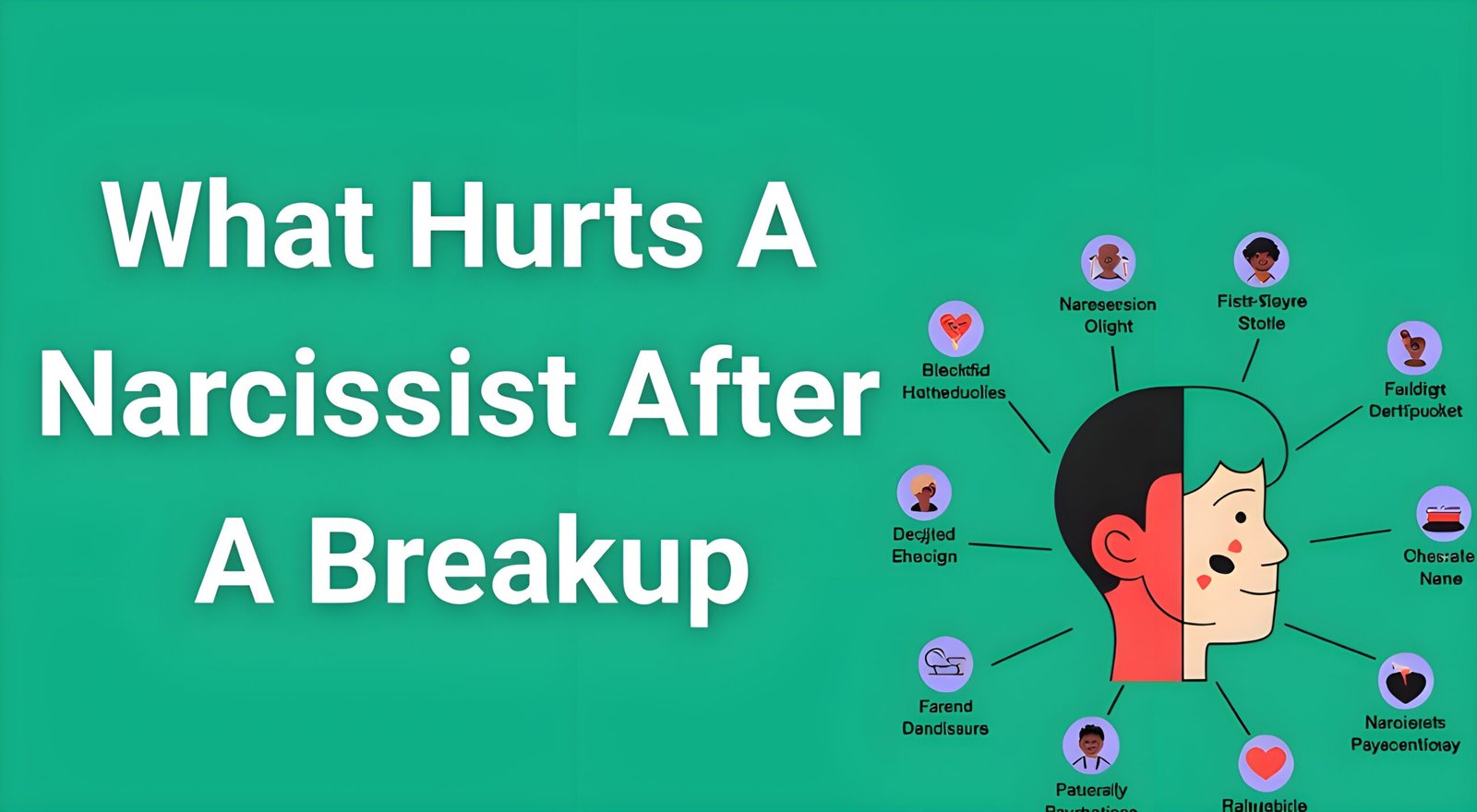When a relationship with a narcissist ends, most people focus on their own healing journey. But understanding what hurts a narcissist after a breakup can provide crucial insights into their psychology and help you navigate the aftermath more effectively. While you should never use this knowledge to intentionally harm someone, comprehending these psychological vulnerabilities can empower you to protect yourself and accelerate your own recovery.
- 1. Complete Loss of Control Over You
- 2. Your Genuine Indifference to Their Existence
- 3. Watching You Thrive Without Them
- 4. Being Replaced by Someone Who Truly Values You
- 5. Public Exposure of Their True Nature
- 6. Your Complete Emotional Independence
- 7. Loss of Narcissistic Supply from Your Social Circle
- 8. Realizing They Can’t Destroy Your Core Identity
- Understanding the Broader Pattern
- Frequently Asked Questions
- Conclusion
The truth about what hurts a narcissist after a breakup goes far deeper than surface-level rejection. These individuals operate from a fundamentally different emotional framework, where their self-worth hinges on external validation and control over others. When that carefully constructed facade crumbles, the psychological impact can be devastating—though they’ll rarely show it openly.
1. Complete Loss of Control Over You
The single most devastating blow to a narcissist’s psyche after a breakup is realizing they no longer have power over your emotions, decisions, or life direction. Narcissists build their entire sense of self around maintaining dominance in relationships, and your independence represents their ultimate failure.
Why This Cuts So Deep:
Control isn’t just a preference for narcissists—it’s a psychological necessity. Their fragmented sense of self depends entirely on manipulating others to maintain their false image of superiority. When you break free and start making autonomous decisions, you’re essentially proving that their perceived power was always an illusion.
What You’ll Notice:
- Desperate attempts to regain influence through manipulation
- Rage when their usual tactics stop working
- Escalating behavior as they realize their powerlessness
- Attempts to involve mutual friends or family to maintain indirect control
Research from Psychology Today reveals that narcissists experience intense anger and hostility when faced with rejection, as it threatens their core need for dominance. This loss of control doesn’t just hurt their feelings—it fundamentally challenges their entire worldview.
Your Protection Strategy:
Maintain strict boundaries and resist the urge to engage with their control attempts. Every time you respond to their manipulation, you’re inadvertently feeding their need for power over you.
2. Your Genuine Indifference to Their Existence
Nothing wounds a narcissist more profoundly than discovering that you’ve genuinely moved on and no longer think about them. Unlike normal breakups where some lingering thoughts are expected, your complete emotional detachment represents their worst nightmare—irrelevance.
The Psychology Behind Their Pain:
Narcissists require what psychologists call “narcissistic supply”—constant attention, admiration, and emotional reactions from others. When you reach a point of genuine indifference, you’re cutting off their most crucial source of psychological sustenance. This isn’t about revenge; it’s about your natural healing process threatening their core identity.
Signs They’re Struggling with Your Indifference:
- Increased attempts to provoke emotional reactions
- Social media posts designed to trigger jealousy or concern
- Reaching out through mutual connections
- Creating false emergencies to test if you still care
Dr. Sam Vaknin, a researcher on narcissistic personality disorder, explains that narcissists cannot comprehend genuine disinterest because their worldview assumes everyone remains psychologically attached to them indefinitely.
The Trauma Bond Factor:
Many survivors struggle with achieving this indifference due to trauma bonding—the psychological attachment formed through cycles of abuse and intermittent reinforcement. If you’re finding it difficult to detach emotionally, this is completely normal. The 30-Day Trauma Bond Recovery Workbook provides a scientifically-based system for breaking these neurological addiction patterns that keep you psychologically tethered to toxic people.
3. Watching You Thrive Without Them
Perhaps the most psychologically devastating reality for a narcissist is witnessing your success and happiness in their absence. This directly contradicts their core belief that you need them to function, exposing the lie they’ve built their superiority complex upon.
Why Your Success Hurts Them:
Narcissists maintain their self-image by keeping others dependent and diminished. Your thriving serves as undeniable proof that:
- Their presence was actually detrimental to your wellbeing
- You’re capable of far more than they allowed you to believe
- Their “irreplaceable” value was entirely fabricated
- Others can see your worth without their validation
What Thriving Looks Like:
- Pursuing goals they previously discouraged or sabotaged
- Building healthy relationships with genuinely supportive people
- Displaying confidence and joy they never witnessed during your relationship
- Achieving professional or personal milestones without their involvement
Their Typical Responses:
Research shows that narcissists often respond to their ex-partner’s success with increased manipulation attempts, smear campaigns, or sudden contact after periods of silence. They may also try to take credit for your achievements or minimize your accomplishments.
Important Note:
While your success naturally hurts them, the goal should always be your authentic growth, not their emotional discomfort. Focus on rebuilding your life for your own fulfillment, not as a form of psychological warfare.
4. Being Replaced by Someone Who Truly Values You
When narcissists see you in a healthy, loving relationship, it forces them to confront the stark contrast between genuine love and their manipulative imitation. This comparison exposes their emotional poverty and inability to form authentic connections.
The Brutal Comparison:
A healthy new relationship in your life reveals everything their relationship lacked:
- Consistent respect and kindness instead of cycles of idealization and devaluation
- Genuine interest in your thoughts and feelings versus self-centered conversations
- Support for your goals rather than subtle sabotage
- Emotional safety instead of walking on eggshells
Why This Hurts Them Specifically:
Narcissists don’t experience genuine love—they experience possession, control, and the ego boost that comes from “owning” someone else’s affection. Seeing you receive authentic love highlights their fundamental incapacity for real intimacy, forcing them to face their emotional limitations.
What You Might Notice:
- Attempts to interfere with your new relationship
- Spreading rumors about your new partner
- Sudden declarations of having “changed” or wanting you back
- Comparing themselves favorably to your new partner
Protecting Your New Relationship:
If you’re building something healthy with someone new, maintain strict boundaries with your narcissistic ex. Share minimal information about your new relationship, and ensure your partner understands the potential for interference or manipulation.
5. Public Exposure of Their True Nature
Narcissists invest enormous energy in maintaining their public image. When their mask slips and others witness their authentic behavior, the psychological impact can be overwhelming—especially when it happens in contexts they can’t control or manipulate.
How Public Exposure Occurs:
- Their own escalating behavior during the breakup reveals their true character
- You sharing your experience with trusted friends or family
- Their manipulative tactics being recognized by others
- Professional consequences resulting from their behavior
Why This Devastates Them:
The narcissist’s public persona is often their most prized possession. They may have spent years carefully crafting an image of charm, success, or moral superiority. When this facade crumbles, they face:
- Loss of social status and admiration
- Decreased ability to manipulate new victims
- Confrontation with their authentic, damaged self
- Isolation as people recognize their patterns
Understanding Their Reaction:
Expect intense rage, smear campaigns, and victim-playing when their public image is threatened. They may work frantically to rebuild their reputation while simultaneously attempting to destroy yours.
Your Role in This Process:
While you shouldn’t seek to expose them vindictively, sharing your truth with trusted individuals serves important purposes:
- Protecting others from similar abuse
- Maintaining your own sanity through validation
- Building a support network for your recovery
Many survivors find that working with a specialist who understands narcissistic abuse patterns can help them process these experiences safely. A comprehensive analysis of your specific situation can provide clarity about the dynamics you experienced and practical strategies for moving forward.
6. Your Complete Emotional Independence
When you reach the point where your emotional state is no longer influenced by their behavior, approval, or presence, you’ve achieved something that fundamentally threatens the narcissist’s worldview. This emotional independence represents their complete failure to maintain psychological control.
What Emotional Independence Looks Like:
- Your mood doesn’t shift based on their actions or communications
- You make decisions without considering their potential reactions
- You don’t seek their validation or approval for your choices
- Their opinions about you hold no emotional weight
- You can think about them without experiencing intense emotions
The Psychology of Their Pain:
Narcissists operate under the assumption that they permanently alter everyone they encounter. Your emotional independence proves this belief false and suggests that their impact on you was temporary and ultimately insignificant.
How They Test Your Independence:
- Sending emotional messages designed to trigger reactions
- Creating situations that historically upset you
- Using flying monkeys to gather information about your emotional state
- Appearing unexpectedly to gauge your response
Building Emotional Independence:
This process often requires addressing the trauma bonds and psychological patterns that kept you emotionally tethered. Understanding the neurological basis of these connections can accelerate your healing process significantly.
7. Loss of Narcissistic Supply from Your Social Circle
Narcissists don’t just lose you during a breakup—they often lose access to your friends, family, and social connections who provided additional sources of admiration and validation. This expanded loss multiplies their psychological distress exponentially.
Understanding Narcissistic Supply:
Narcissistic supply refers to the attention, admiration, emotional reactions, and validation that narcissists require to maintain their psychological stability. Your social circle likely provided:
- Additional people to impress and manipulate
- Witnesses to their “successful” relationship performance
- Secondary sources of validation and attention
- Opportunities to demonstrate their superiority
The Compound Loss:
When healthy people in your life recognize the narcissist’s true nature, they often withdraw their support and admiration. This creates a cascading effect where the narcissist loses multiple sources of supply simultaneously.
Their Desperate Recovery Attempts:
- Trying to maintain relationships with your friends and family
- Attempting to turn your support system against you
- Seeking new sources of supply to replace what they’ve lost
- Engaging in increasingly attention-seeking behavior
Why This Hurts Them Disproportionately:
Unlike emotionally healthy individuals who have internal sources of self-worth, narcissists depend entirely on external validation. Losing multiple sources simultaneously can trigger what psychologists call “narcissistic collapse”—a state of profound psychological distress.
8. Realizing They Can’t Destroy Your Core Identity
The ultimate blow to a narcissist’s ego is the discovery that despite their best efforts to diminish, control, and reshape you, your authentic self remains intact and is now flourishing. This realization exposes the limits of their power and the resilience of your spirit.
What This Looks Like:
- You reconnecting with interests and values they criticized
- Your personality traits they tried to suppress returning stronger
- You maintaining core beliefs despite their gaslighting attempts
- Your natural confidence and self-worth being restored
- You forming opinions and making choices that reflect your true self
The Psychology Behind Their Devastation:
Narcissists attempt to psychologically colonize their victims, replacing the authentic self with a version that serves their needs. When this psychological colonization fails completely, it represents:
- The futility of their manipulation efforts
- Your strength exceeding their power
- Their inability to fundamentally change another person
- The temporary nature of their influence
Signs Your Core Identity Is Intact:
- You remember who you were before the relationship
- Your values and interests return naturally
- You trust your perceptions and instincts again
- You make decisions based on your authentic desires
- You no longer doubt your fundamental worth as a person
The Role of Professional Support:
Recovery often involves not just healing from abuse, but rediscovering who you are beneath the layers of manipulation and control. Sometimes this process requires professional guidance, especially when dealing with complex trauma patterns or when you’re still in situations where you can’t leave immediately.
For those who find themselves trapped in ongoing toxic situations, specialized resources exist to help you survive and maintain your psychological integrity until you can safely extract yourself. Learning how to protect your mental health while navigating unavoidable contact can be life-saving knowledge.
Understanding the Broader Pattern
What hurts a narcissist after a breakup reveals a consistent pattern: anything that challenges their false sense of superiority, exposes their manipulative nature, or proves their impact on you was limited and temporary will cause them significant psychological distress. However, it’s crucial to understand that their pain stems from ego injury, not genuine emotional growth or self-reflection.
Important Distinctions:
- Their hurt doesn’t indicate capacity for change or genuine remorse
- They’re mourning the loss of control, not the loss of authentic love
- Their distress is self-focused, not empathetic toward your experience
- They view your recovery as a personal attack rather than natural healing
The Difference in Recovery:
While you may experience genuine grief, confusion, and trauma requiring real healing work, their experience centers around ego restoration and finding new sources of validation. Understanding this distinction protects you from misinterpreting their post-breakup behavior as evidence of authentic emotion or change.
Your Focus Should Remain on Your Own Healing:
Rather than monitoring their reactions or trying to maximize their discomfort, channel your energy toward:
- Processing your own trauma and emotions
- Rebuilding your identity and self-worth
- Establishing healthy boundaries and relationships
- Developing skills to recognize and avoid future toxic patterns
Frequently Asked Questions
Q: Is it wrong to feel satisfied knowing these things hurt them?
A: It’s completely natural to feel validation when you understand the psychology behind their distress. This knowledge often helps survivors realize that their reactions during the relationship were normal responses to abnormal treatment, not personal failures.
Q: Will a narcissist ever genuinely suffer or learn from losing me?
A: Narcissists experience ego injury and frustration, but this rarely translates into genuine self-reflection or behavior change. Their suffering typically motivates them to find new sources of validation rather than examine their patterns.
Q: Should I use this information to intentionally hurt them?
A: No. Using this knowledge to deliberately cause pain keeps you psychologically tied to the toxic dynamic and delays your healing. Focus on your recovery and protection rather than revenge.
Q: How long does it take for a narcissist to “get over” a breakup?
A: Narcissists don’t “get over” breakups in the traditional sense. They typically cycle through rage, attempts to regain control, finding new supply sources, and occasional returns to previous victims. The timeline varies but the pattern remains consistent.
Q: Why do they seem to move on so quickly with someone new?
A: What appears as “moving on” is actually them securing new sources of narcissistic supply. They don’t form genuine emotional bonds, so they don’t require authentic healing time between relationships.
Conclusion
Understanding what hurts a narcissist after a breakup isn’t about seeking revenge—it’s about comprehending the psychological dynamics that kept you trapped and recognizing your own strength in breaking free. These insights reveal that your ability to recover, thrive, and maintain your authentic self represents the ultimate victory over their attempts to diminish you.
The most powerful thing you can do after a narcissistic relationship is to focus entirely on your own healing and growth. When you prioritize rebuilding your life, establishing healthy boundaries, and reconnecting with your authentic self, you naturally achieve everything that wounds their ego—not through deliberate action, but as a natural byproduct of genuine recovery.
Your journey forward should be defined by what serves your highest good, not by what causes them distress. In choosing your own wellbeing over their psychological needs, you demonstrate the strength they tried so hard to suppress and reclaim the power they worked so desperately to steal.
Remember: you survived their worst, and now you have the opportunity to discover your best. That transformation, pursued for your own fulfillment and joy, represents the most profound victory possible—not over them, but for yourself.






